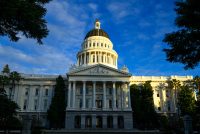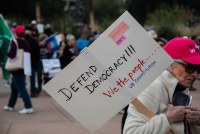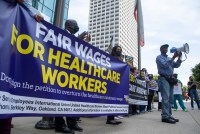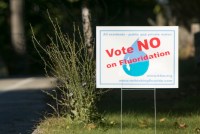Latest KFF Health News Stories
Paid Sick Leave Sticks After Many Pandemic Protections Vanish
The U.S. is one of nine countries that do not guarantee paid sick leave. Since the covid pandemic, advocates in states including Missouri, Alaska, and Nebraska are organizing to take the issue to voters with ballot initiatives this November.
Las organizaciones sin fines de lucro señalan que California ha vuelto más difícil retener a los trabajadores en tareas de cuidado después que aumentara los salarios en otros sectores vinculados a los servicios y la salud.
‘Breaking a Promise’: California Deficit Could Halt Raises for Disability Workers
Families of children and adults with intellectual and developmental disabilities say Gov. Gavin Newsom is reneging on an expected pay increase for care workers. If the delay goes through, it could impede services and invite legal challenges from advocates.
What Florida’s New 6-Week Abortion Ban Means for the South, and Traveling Patients
Florida has served as a haven for Southern pregnant women with little or no access to abortions. But the Florida Supreme Court upheld a six-week abortion restriction that begins in May — so now women across much of the South seeking abortions will have to look farther afield.
What the Health? From KFF Health News: Abortion — Again — At the Supreme Court
For the second time in as many months, the Supreme Court heard arguments in an abortion case. This time, the justices are being asked to decide whether a federal law that requires emergency care in hospitals can trump Idaho’s near-total abortion ban. Meanwhile, the federal government, for the first time, will require minimum staffing standards for nursing homes. Alice Miranda Ollstein of Politico, Tami Luhby of CNN, and Joanne Kenen of Johns Hopkins University and Politico Magazine join KFF Health News’ Julie Rovner to discuss these stories and more. Plus, for “extra credit,” the panelists suggest health policy stories they read this week they think you should read, too.
California Legislators Debate Froot Loops and Free Condoms
California state lawmakers this year are continuing their progressive tilt on health policy, debating bills banning an ingredient in Froot Loops and offering free condoms for high schoolers.
Newsom Offers a Compromise to Protect Indoor Workers from Heat
After rejecting proposed rules to protect millions of workers in sweltering warehouses, steamy kitchens, and other hot workplaces, California Gov. Gavin Newsom’s administration has offered a compromise to allow the protections to take effect this summer. But state and local correctional workers — and prisoners — would have to wait even longer.
What the Health? From KFF Health News: Too Big To Fail? Now It’s ‘Too Big To Hack’
Congress this week had the chance to formally air grievances over the cascading consequences of the Change Healthcare cyberattack, and lawmakers from both major parties agreed on one culprit: consolidation in health care. Plus, about a year after states began stripping people from their Medicaid rolls, a new survey shows nearly a quarter of adults who were disenrolled are now uninsured. Jessie Hellmann of CQ Roll Call, Sarah Karlin-Smith of the Pink Sheet, and Lauren Weber of The Washington Post join KFF Health News’ Mary Agnes Carey to discuss these stories and more. Also this week, KFF Health News’ Julie Rovner interviews Caroline Pearson of the Peterson Health Technology Institute.
Paris Hilton Speaks up for California’s ‘Troubled’ Teens
Heiress Paris Hilton is on a mission to shine a light on the “troubled teen industry,” a largely unregulated multibillion-dollar industry that is gaining public scrutiny for alleged abuse of vulnerable youths. Hilton told state lawmakers in Sacramento on Monday she was subjected to abuse disguised as therapy decades ago when she was housed in […]
Conservative Justices Stir Trouble for Republican Politicians on Abortion
Republicans are learning the admonition “be careful what you wish for,” as conservative judges cause them political problems over abortion in a crucial election year.
California Health Workers May Face Rude Awakening With $25 Minimum Wage Law
A medical industry challenge to a $25 minimum wage ordinance in one Southern California city suggests health workers statewide could face layoffs and reductions in hours and benefits under a state law set to begin phasing in in June. Some experts are skeptical, however, that it will have such effects.
Más condados prohíben el fluoruro en el agua potable. Cómo afecta a la prevención dental
En los últimos años cientos de comunidades han dejado de agregar fluoruro a sus suministros de agua o han votado para evitar agregarlo, a pesar que la ciencia dice que ese nutriente ayuda a la salud dental y previene gastos en tratamientos dentales.
As Bans Spread, Fluoride in Drinking Water Divides Communities Across the US
The broad availability of over-the-counter dental products containing fluoride has some community leaders arguing that its addition to public drinking water is no longer necessary. But public health experts worry that, much like vaccines, fluoridation may be a victim of its own success.
Feds Join Ranks of Employers with Generous Fertility Benefits
Starting this year, federal employees can choose plans that cover a broad menu of fertility services, including up to $25,000 annually for in vitro fertilization procedures. At the same time, politics around IVF and reproductive health have become a central issue in the current election-year debate.
The GOP Keeps Pushing Medicaid Work Requirements, Despite Setbacks
Work requirements in Medicaid expansion programs are back on the agenda in many statehouses — despite their lackluster track record. In Mississippi, the idea has momentum from GOP lawmakers advancing legislation to expand Medicaid. In Kansas, the Democratic governor proposed work requirements to try to soften Republican opposition to expansion. (She’s had little luck, so […]
California Universities Are Required to Offer Abortion Pills. Many Just Don’t Mention It.
One year after California became the first state to require public universities to provide abortion pills to students, LAist found that basic information for students to obtain the medication is often nonexistent.
California Is Expanding Insurance Access for Teenagers Seeking Therapy on Their Own
A California law that takes effect this summer will grant minors on public insurance the ability to get mental health treatment without their parents’ consent, a privilege that their peers with private insurance have had for years. But the law has become a flashpoint in the state’s culture wars.
Adolescentes podrían ir al psicólogo sin tener el permiso de sus padres
Según la nueva ley en California, los jóvenes podrán hablar con un terapeuta sobre la identidad de género sin el consentimiento de sus padres. Pero no podrán recibir tratamiento residencial, medicación o cirugía de afirmación de género sin el visto bueno de sus padres, como han sugerido algunos opositores.
This State Isn’t Waiting for Biden To Negotiate Drug Prices
As the federal government negotiates with drugmakers to lower the price of 10 expensive drugs for Medicare patients, impatient legislators in some states are trying to go even further. Leading the pack is Colorado, where a new Prescription Drug Affordability Review Board is set to recommend an “upper payment limit” for drugs it deems unaffordable. In late […]
Move to Protect California’s Indoor Workers From Heat Upended by Cost Questions
A years-long process that would have created heat standards for California workers in warehouses, steamy kitchens, and other indoor job sites catapulted into chaos Thursday when Gov. Gavin Newsom’s administration pulled its support. Regulators, saying they felt “blindsided,” approved the regulation anyway. It’s unclear what happens next.




















